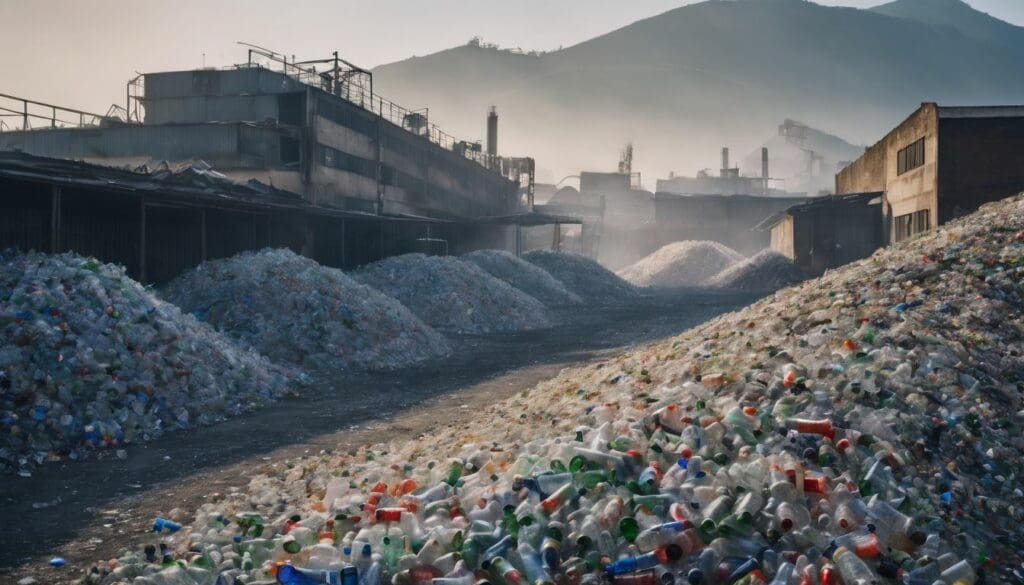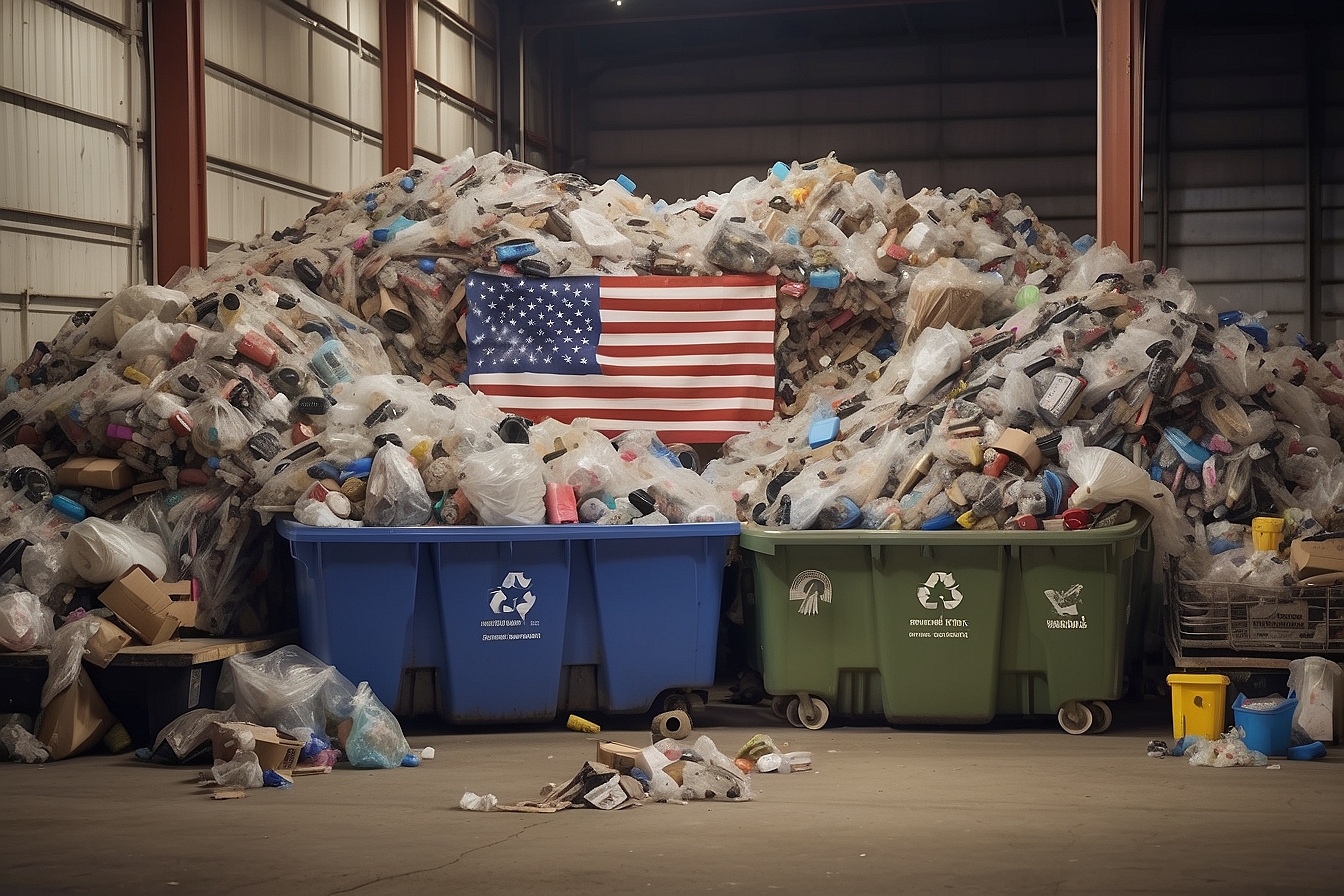We’ve all seen those harrowing images of landfills brimming to the edges, and it’s no secret that waste management has become a critical environmental quandary. Like you, we find ourselves deeply concerned about the distressing fact that solid waste is responsible for 3% of worldwide greenhouse gas emissions.
In our blog, we’re delving into the nitty-gritty of this issue with eyes wide open, offering actionable insights on how each one of us can be part of the change. Stay with us as we explore how minor tweaks to our daily disposal habits could make a world of difference to Mother Earth’s well-being.
Key Takeaways
- Methane, a potent greenhouse gas emitted from landfills due to decomposing organic waste like food and garden trimmings, significantly contributes to climate change.
- The global increase in municipal waste exacerbates the methane emission problem; however, implementing landfill gas collection systems and encouraging composting can help mitigate these effects.
- Utilising energy – efficient appliances and switching to renewable energy sources are effective ways of reducing our overall energy consumption and carbon footprint.
- Efficient recycling reduces the need for raw material extraction and manufacturing, resulting in lower industrial emissions and less waste sent to landfills or incinerators.
- Adoption of sustainable practices such as proper waste disposal, increasing recycling rates, and promoting public awareness can decrease emissions from waste management.
The Connection Between Waste and Climate Change
Methane emissions from landfills are a major contributor to climate change, and with growing global waste, the problem is only getting worse. However, there are solutions in place to reduce methane emissions and mitigate the impact of waste on the environment.
Methane emissions from landfills
We often overlook the silent but significant contributors to climate change, such as methane emissions from landfills. These emissions come from organic waste like food leftovers and garden trimmings decomposing without oxygen.
As these materials break down, they release methane, a greenhouse gas many times more potent than carbon dioxide at trapping heat in the atmosphere.
Our local dumps have become hotspots for this powerful pollutant, adding to our global warming woes. By reducing food loss and increasing composting efforts, we curb these emissions’ environmental impact.
We need comprehensive solutions that address landfill design and waste management practices to tackle the problem head-on. The fight against climate change includes cutting down on what ends up in our bins; every item not discarded is a step towards sustainability and lowering our ecological footprint.
Growing global waste
As we consider the impact of waste on climate change, it’s crucial to acknowledge the concerning trend of growing global waste. The increasing volume of municipal waste is contributing to higher methane emissions and a larger carbon footprint.
With consumption patterns on the rise, this surge in waste poses a significant challenge in our efforts to mitigate climate change and reduce pollution.
Furthermore, addressing the issue of growing global waste requires urgent attention from individuals and communities across the globe. By implementing sustainable practices and embracing responsible consumption habits, we can curb the escalating levels of waste generation and work towards a cleaner, healthier planet for future generations.
Solutions to reduce methane emissions
To reduce methane emissions, we can implement various solutions:
- Implementing landfill gas collection systems to capture methane and convert it into renewable energy.
- Encouraging the diversion of organic waste from landfills through composting, which reduces methane emissions.
- Advancing waste-to-energy technologies such as anaerobic digestion to convert organic waste into biogas and fertilisers.
- Promoting the use of alternative cover materials in landfills to reduce methane production.
- Increasing public awareness about the impact of food waste on methane emissions and encouraging reduction efforts at the consumer level.
The Impact of Recycling on Climate Change
Recycling plays a crucial role in reducing energy consumption and emissions from waste management. By recycling materials, we can lower our carbon footprint and make a positive impact on the environment.
The importance of recycling cannot be overstated in the fight against climate change.
Reducing energy consumption
Reducing energy consumption is crucial in the fight against climate change. By using energy-efficient appliances and lighting, we can significantly decrease our carbon emissions. Making simple changes such as turning off lights and unplugging devices when not in use can have a big impact on reducing our greenhouse gas footprint.
Switching to renewable energy sources like solar or wind power also plays a vital role in lowering our overall energy consumption and decreasing our reliance on fossil fuels. These steps are essential for minimising our overall environmental impact while contributing positively to the conservation of natural resources.
Reducing emissions from waste management
Reducing emissions from waste management is crucial in the fight against climate change. By implementing efficient waste management practices, we can significantly decrease methane emitting from landfills and incineration.
This involves utilising advanced technologies to capture and convert methane into usable energy, thus minimising its harmful impact on the environment. Additionally, promoting sustainable consumption habits and increasing recycling rates are vital steps towards reducing emissions from waste management.
Incineration of waste has a direct impact on emissions reduction. By focusing on innovative methods such as waste-to-energy processes, we can effectively limit the release of greenhouse gases into the atmosphere.
Encouraging individuals to embrace proper waste disposal and recycling behaviours plays a significant role in mitigating the environmental consequences of excessive landfill usage.
The importance of recycling in fighting climate change
Recycling plays a crucial role in fighting climate change. When we recycle materials such as paper, glass, and plastic, we reduce the need for raw material extraction and manufacturing processes.
This results in lower energy consumption and reduced emissions from industrial production, directly impacting climate change. By recycling more effectively, we can actively contribute to mitigating the environmental impact of waste on our planet.
Furthermore, recycling helps to reduce the amount of waste sent to landfills or incinerators. By diverting recyclable materials from these disposal methods, we significantly decrease methane emissions – a potent greenhouse gas contributing to global warming.
Conclusion
In conclusion, waste management directly affects climate change. Landfill methane emissions contribute to global warming. Recycling significantly reduces energy consumption and waste-related emissions.
By taking action to reduce waste, we can play a crucial role in mitigating climate change’s impact on the environment.
FAQs
1. How does waste contribute to climate change?
Waste contributes to climate change when it releases greenhouse gases as it decomposes, especially in landfills.
2. Can reducing waste help combat climate change?
Yes, cutting down on consumption and waste can significantly reduce the impact on the environment and help fight against climate change.
3. What types of waste have the biggest effect on our planet’s climate?
Organic waste like food scraps and yard debris has a big effect because they create methane, a potent greenhouse gas, when they break down without air in landfills.
4. Is recycling an effective way to mitigate the link between waste and climate change?
Recycling is very effective; it reduces the need for new materials, saves energy, and cuts greenhouse gas emissions from production and disposal processes.





